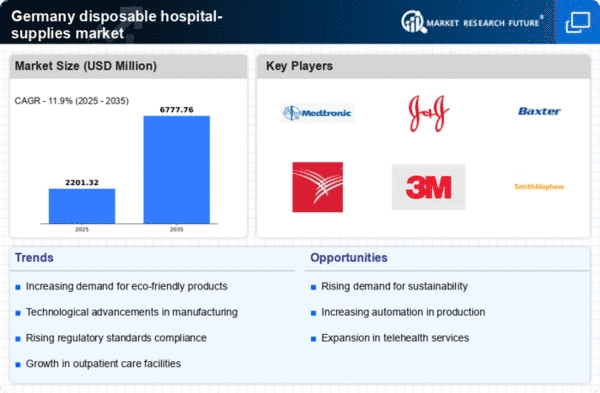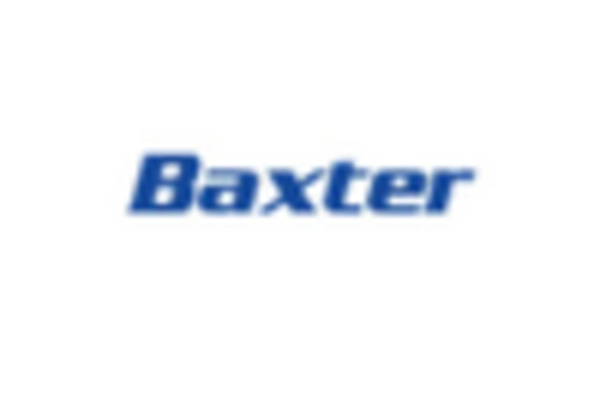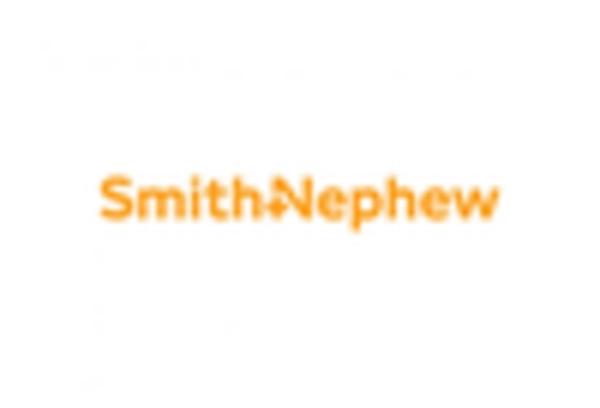Increased Healthcare Expenditure
The disposable hospital-supplies market benefits from the rising healthcare expenditure in Germany, which has been steadily increasing over the years. With the government and private sectors investing more in healthcare infrastructure, hospitals are expanding their services and upgrading their facilities. This expansion often necessitates the procurement of disposable supplies to ensure efficient and safe patient care. Market data suggests that healthcare spending in Germany is expected to reach approximately €500 billion by 2026, which will likely bolster the demand for disposable hospital supplies. As healthcare facilities strive to enhance their operational efficiency, the reliance on disposable products is anticipated to grow, further propelling market dynamics.
Regulatory Compliance and Standards
The disposable hospital-supplies market is significantly influenced by stringent regulatory compliance and standards set by health authorities in Germany. These regulations ensure that all disposable products meet safety and quality benchmarks, which is crucial for maintaining patient safety and trust. Compliance with these standards often requires manufacturers to invest in advanced technologies and quality assurance processes. As a result, the market is witnessing a shift towards higher-quality disposable products that adhere to these regulations. This focus on compliance not only enhances the reputation of manufacturers but also drives market growth, as healthcare facilities are more likely to procure products that meet or exceed regulatory requirements.
Rising Demand for Single-Use Products
The disposable hospital-supplies market experiences a notable increase in demand for single-use products, driven by heightened awareness of infection control and patient safety. Hospitals and healthcare facilities in Germany are increasingly adopting single-use items to minimize cross-contamination risks. This trend is reflected in market data, indicating that the market is projected to grow at a CAGR of approximately 6.5% over the next five years. The shift towards single-use products is not only a response to regulatory pressures but also aligns with the preferences of healthcare professionals who prioritize patient safety. As a result, manufacturers are focusing on developing innovative disposable products that meet stringent safety standards, thereby enhancing their market presence.
Growing Awareness of Hygiene Practices
The disposable hospital-supplies market is positively impacted by the growing awareness of hygiene practices among healthcare professionals and patients alike. In Germany, there is an increasing emphasis on maintaining high standards of cleanliness and sanitation within healthcare settings. This heightened awareness drives the demand for disposable products, as they are perceived as a more hygienic option compared to reusable items. Hospitals are adopting disposable supplies to ensure compliance with hygiene protocols, thereby reducing the risk of hospital-acquired infections. This trend is likely to continue, as both healthcare providers and patients prioritize safety and cleanliness, further stimulating market growth.
Technological Innovations in Product Development
The disposable hospital-supplies market is witnessing a wave of technological innovations that enhance product development and functionality. Manufacturers are increasingly investing in research and development to create advanced disposable products that offer improved performance and safety features. Innovations such as biodegradable materials and enhanced barrier properties are becoming more prevalent, catering to the evolving needs of healthcare facilities. This focus on technology not only addresses environmental concerns but also aligns with the growing demand for high-quality disposable supplies. As a result, the market is expected to expand, driven by the introduction of innovative products that meet the diverse requirements of healthcare providers.
















